SanDisk Extreme Pro SSD (240GB, 480GB & 960GB) Review: The Fastest Just Got Faster
by Kristian Vättö on June 16, 2014 4:00 PM EST- Posted in
- Storage
- SSDs
- SanDisk
- Extreme Pro
Random Read/Write Speed
The four corners of SSD performance are as follows: random read, random write, sequential read and sequential write speed. Random accesses are generally small in size, while sequential accesses tend to be larger and thus we have the four Iometer tests we use in all of our reviews.
Our first test writes 4KB in a completely random pattern over an 8GB space of the drive to simulate the sort of random access that you'd see on an OS drive (even this is more stressful than a normal desktop user would see). We perform three concurrent IOs and run the test for 3 minutes. The results reported are in average MB/s over the entire time.
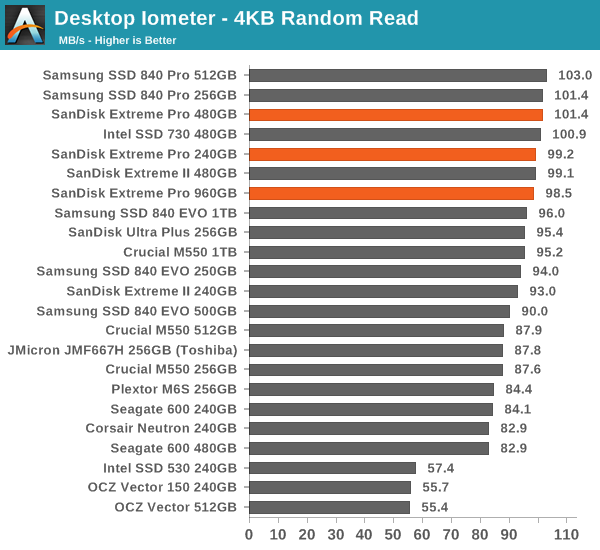
The random read performance is great, which was expected when coming from the Extreme II.
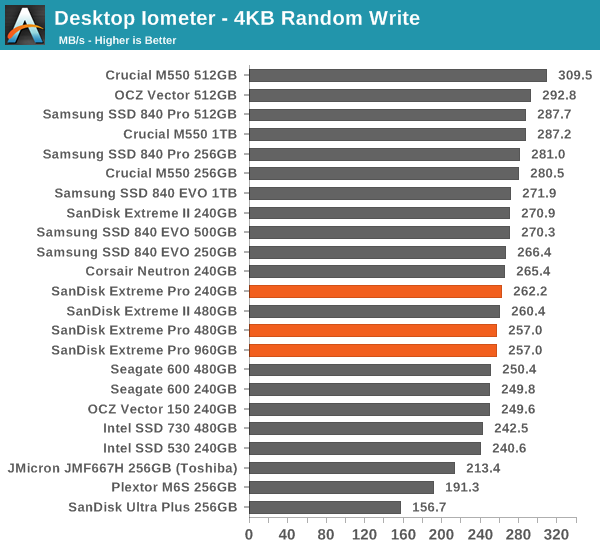
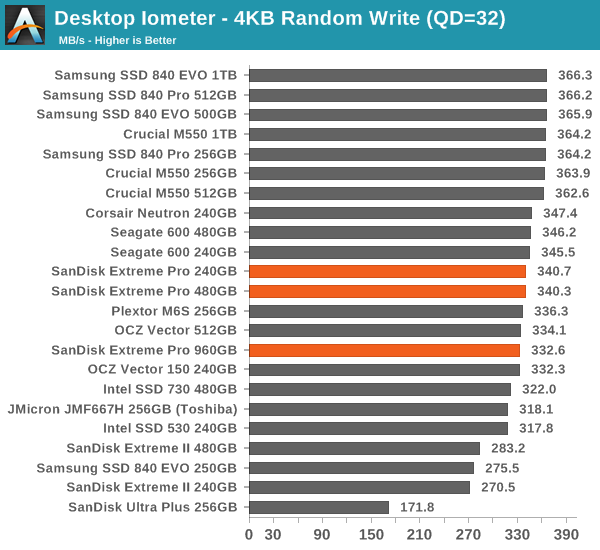
Random write performance, on the other hand, is only mediocre, although it's consistency that matters and not necessarily the peak performance. It seems that drives with high consistency do not have as good peak performance because the Extreme Pro, Vector 150 and SSD 730 are in the middle, whereas the 840 EVO and M550 lead the pack despite their relatively poor IO consistency. I would take consistency over ~10% better peak performance, though.
Sequential Read/Write Speed
To measure sequential performance we run a 1 minute long 128KB sequential test over the entire span of the drive at a queue depth of 1. The results reported are in average MB/s over the entire test length.
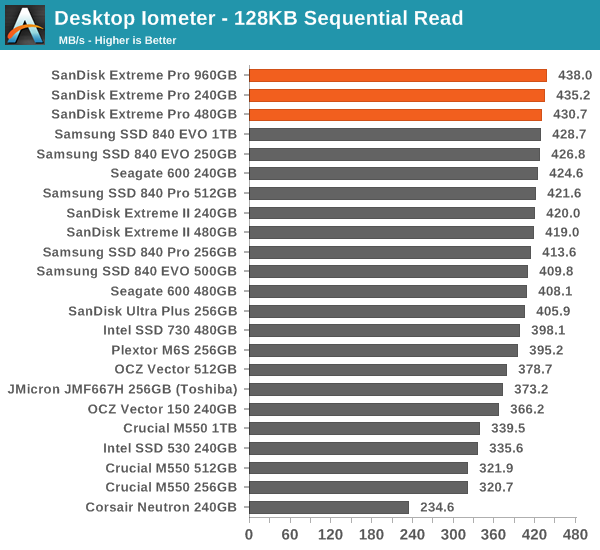
Sequential performance is definitely good. I think the high read speed is one of the reasons why the Extreme Pro did so well in the 2013 Storage Bench because both the SSD 730 and Vector 150 are noticeably slower.
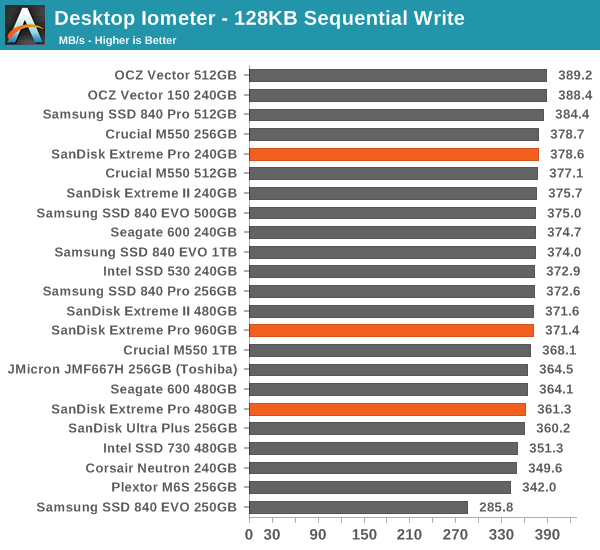
AS-SSD Incompressible Sequential Read/Write Performance
The AS-SSD sequential benchmark uses incompressible data for all of its transfers. The result is a pretty big reduction in sequential write speed on SandForce based controllers.
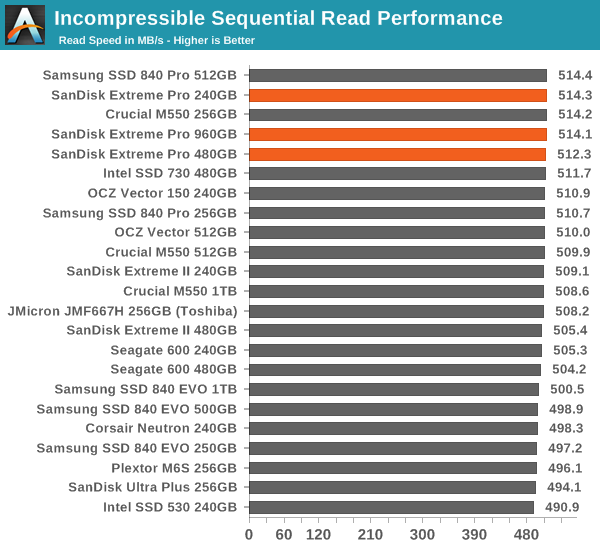
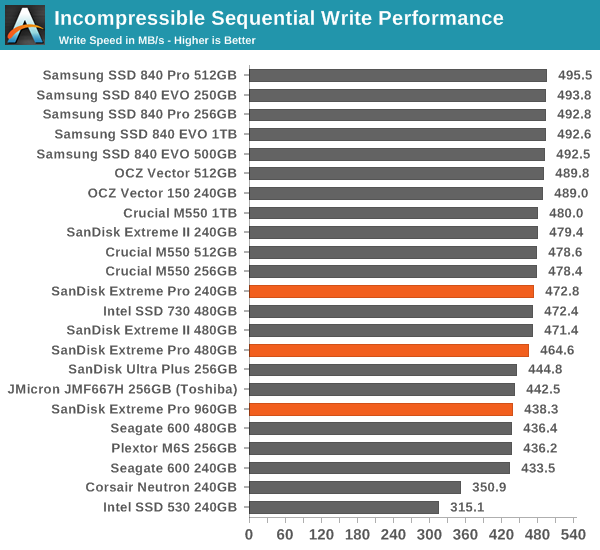










85 Comments
View All Comments
Solix - Tuesday, June 17, 2014 - link
I get the enthusiasm for the increase in bandwidth by going PCIe, but there are other constraints for some of us. What about those of us that already have all of their PCIe slots crammed full to the brim with GPUs and Sound cards and stuff? Maybe vendors can put internal PCIe slots in without the need for using a chassis slot. After all, most of them just have a back plate with nothing right? Or something that lets me use a riser cable and mount it elsewhere instead of burning a precious one of my back panel slots.457R4LDR34DKN07 - Tuesday, June 17, 2014 - link
That is essentially what M.2 does...TelstarTOS - Tuesday, June 17, 2014 - link
Thanks. I really needed to see the performance of the new model before buying the old one on sale :)mapesdhs - Tuesday, June 17, 2014 - link
Kristian, just curious, why did the Vector 512GB top the IOMeter Sequential
Write table? Just seems a bit of an oddity given where it ends up in all the
other tables.
Btw, your AS-SSD tables are amusing in this regard; I ran AS-SSD on my
Vector 512GB, it gave 516.94 seq. read, 502.78 seq. write (topping both
tables), overall score of 1091. Interestingly, although my Vector 128GB
drops its seq. write to 386, the seq. read still stays healthy at 515.18.
I do like the Vector series, they work very well. I bought a Vector-150
128GB; it's seq. write is 10% higher, but the 4K numbers are lower,
resulting in a reduced overall score (989 vs. 1040).
The highest overall score I've had so far was 1147 from an 840 Pro 512GB.
(all done via Intel SATA3 on Z68)
Ian.
mapesdhs - Tuesday, June 17, 2014 - link
Caveat: in general prefer Samsung models for C-drives, for better long termconsistency. Here's the 840 250GB in my 3930K setup:
http://www.sgidepot.co.uk/misc/samsung_840_250GB_H...
Vectors are great for AE cache drives (ditto Vertex4), though my 2700K does
have a Vector 256GB for its C-drive; here's an HDTach:
http://www.sgidepot.co.uk/misc/OCZ_Vector_256GB_HD...
Pretty decent; not as quick/smooth as my 3930K's 840 250GB, though an AS-SSD
run is good:
http://www.sgidepot.co.uk/misc/OCZ_Vector_256GB_AS...
These Extreme Pros look interesting. I might get one to see how they fare for AE, etc.
Ian.
KAlmquist - Wednesday, June 18, 2014 - link
In case anyone missed it,the Sandisk Extreme Pro prices listed on the last page of the article are not real prices because the items were out of stock at the time the reviewer pulled the prices from Newegg. Now the 240 and 480 GB models are in stock for $270 and $400, respectively. All three models are in stock at Amazon.com with prices of $240, $430, and $700.The SSD market is looking like what we often see in the CPU market, with large price premiums for the fastest models. I won't be buying a Sandisk Extreme Pro, but there probably are people who could really benefit from the performance.
Xajel - Wednesday, June 18, 2014 - link
Interesting, the price went up..The 240GB model is cheaper in Amazon now compared to newegg
( A vs. NE ) : $229.99 vs. $269.95 or $0.958/GB vs. $1.125/GB
The 480GB model is cheaper in newegg
( A vs. NE ) : $429.99 vs. $399.95 or $0.896/GB vs. $0.833/GB
The 960GB model is not available in newegg.. but it cost $699.99 or $0.729/GB in Amazon
milli - Wednesday, June 18, 2014 - link
"SanDisk is turning out to be a very dangerous player in the client SSD space. With nearly perfect vertical integration model (they just lack client controller silicon and DRAM), SanDisk has the ability to put against Samsung and Intel who have traditionally held the performance crown."They actually do have their own controller. The U110 and the Standard (and maybe more) use Sandisk's own controller. Granted these are low end.
skarthikeyan - Saturday, June 21, 2014 - link
Hi, shouldn't writes be slower than reads in drives, more so in SSDs? For eg, on http://anandtech.com/show/8170/sandisk-extreme-pro... sequential read for the Extreme Pro 960GB is 438 MBps while sequential write is 371.4. But in the case of random read(98.5) vs write(257MBps for QD=1), write is faster. Why is that the case?skarthikeyan - Saturday, June 21, 2014 - link
Sorry, my comma broke the link, the correct link to that page is http://anandtech.com/show/8170/sandisk-extreme-pro...